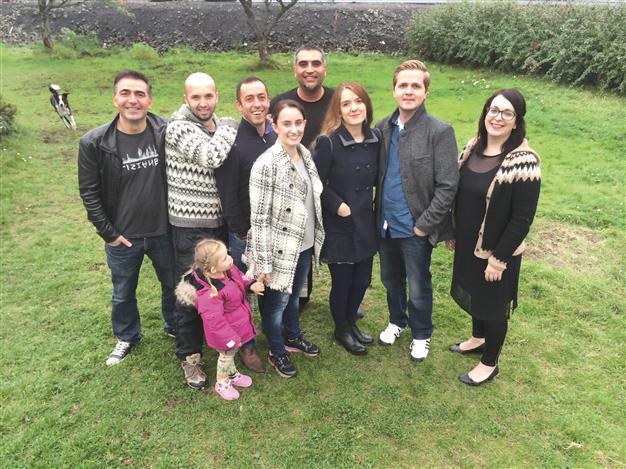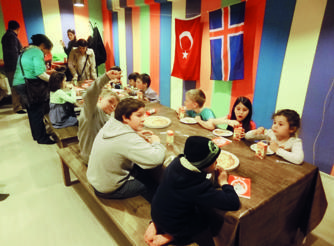Iceland’s tiny Turkish community eager to promote culture
Özgür Korkmaz REYKJAVIK
 Turks have little trouble finding fellow countrymen wherever they travel, and the volcanic island just below the Arctic Ocean is no exception.
Turks have little trouble finding fellow countrymen wherever they travel, and the volcanic island just below the Arctic Ocean is no exception.Iceland has a Turkish community of around 50 people, who have come together and founded an association to introduce Turkish culture both to their children and Icelanders.
“The idea was to do something for our children to learn about Turkish culture and traditions,” Çetin Çağlar Çetin, the chairman of the Iceland Turkish Culture Association (Tyrknesk-íslenska menningarfélagið). “A get together for April 23 National Sovereignty and Children’s Day, and we had five kids at that event. In this year’s event, we had more than 25, including local kids.”
Çetin came to the island eight years ago after marrying Ingigerdur Einarsdottir and they have two children, 7-year-old daughter Julia Esma and 5-year-old son Einar Ozan. Marriage is the reason why most of the Turks have moved to Iceland, and raising bicultural, bilingual kids has been a challenge for all.
“We often organize book-reading sessions and read Turkish books to our children to improve their language skills,” said Çetin, who added that there are around 20 children in Iceland who are younger than 10 and have at least one Turkish parent.
“We get together on national holidays and religious holidays to have our children experience the Turkish culture,” said the association chair.
Zeynep Dağdevir Maggason, a local of the Aegean province of İzmir, was happy that the language interaction worked the both ways. Speaking Icelandic is a major challenge for every foreigner on the island.
“My Icelandic is still not very good, but I owe the level of my language to Ada, my 3-year-old daughter,” said Zeynep. “I speak in Turkish to her all the time and she usually prefers Icelandic.”
 The community members are eager to speak the local language and are to organize a language class within the association. Sema Erla Serdaroğlu, the daughter of one of the first Turks who came to Iceland, will be the instructor of the course.
The community members are eager to speak the local language and are to organize a language class within the association. Sema Erla Serdaroğlu, the daughter of one of the first Turks who came to Iceland, will be the instructor of the course.There are not only cultural but also physical difficulties of living in Iceland, which has a population of 325,000. It may be too quiet and calm for a person who is used to life in Turkish metropoles, and the long and dark Nordic nights do not help.
“To be able to be happy in Iceland, you have to adapt to the life here,” said Hakan Gültekin, who moved to Iceland 15 years ago and is one of the owners of Reykjavik’s sole traditional Turkish restaurant, Meze.
“We had some Turks who left the country after living here for some time, it is a difficult country especially in the winter,” said Hakan. “But once you are get used to the life here, it is not easy to leave and reside in anywhere else.”
Another aim for the Turkish community in Iceland has been introducing their own culture to the locals. The association was of a festival promoting multiculturalism last month with Çetin, and Icelandic music enthusiast Asgeir Asgeirsson plays the bağlama, a traditional Turkish folk instrument, on the main street of Reykjavik.
“We played Turkish songs, served Turkish coffee and Turkish delight to passersby; there was great interest,” said Çetin. “Turkish culture is not much known to Icelanders, and we hope to be working on that.”
Tomorrow’s 2016 European Championship qualification game between Iceland and Turkey will also be an opportunity for Turks in Iceland. They have already made plans to welcome the national team at the airport, hoping to make them feel that they will not be alone anywhere, even on this remote volcanic island.
















